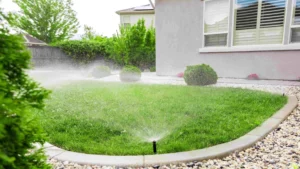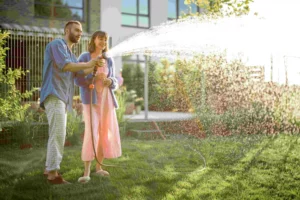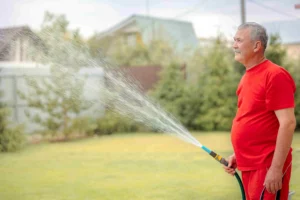As the weather gets cooler, many homeowners need help with lawn keeping. It becomes confusing to decide when to stop watering your lawn. This problem usually occurs during the fall season. The lack of heat means the water will not evaporate as quickly as it usually does during summer.
It is crucial to look after your lawn during those autumn months so you can continue to have a visually appealing yard all year round. You have to decrease the amount of watering but only at the end of the season.
Understanding when to stop watering your lawn is essential to your lawn care routine. Deciding when you should decrease the amount of water you give to your lawn depends on the first freeze of the year.
How to Know When to Stop Watering Your Lawn in the Fall

The heat intensity during summers can turn your lawn brown and dull, but if you are willing to maintain consistent watering practices, you can successfully keep your lawn lush throughout the year. Once autumn appears, you need to adjust how you care for your lawn to prepare for the coming months.
When to Stop Watering the Lawn?
Autumn is a time when the temperature significantly drops and the day becomes shorter. You can feel a chill in the air and be assured that your grass feels it, too. The growth of your grass considerably slows down during the autumn months.
Because there is less sunshine to help evaporate the water on your lawn, your lawn requires less hydration. However, this does not mean you should stop watering your lawn suddenly and completely.
You can follow a set of basic rules applicable to all parts of the country for when to stop watering your lawn.
- If the weather is warm and dry, continue watering your lawn at least a few times a week.
- You can also continue providing supplemental moisture as required until the first freeze.
- If your area is experiencing precipitation and rainfall of more than one inch per week, you do not need to water your lawn.
- If your lawn is overwatered, fungal diseases may take over your grass.
- If you have recently gotten a new lawn or one that has been overseeded, you can continue your regular lawn watering routine to promote growth and help the grass to establish strong roots in the ground.
- It would be best if you continued to water your lawn during autumn until the ground freezes. Once the first freeze has occurred, the lawn grass will become dormant and only need irrigation in the spring months after winter.
- Water your lawn early in the morning, as this will provide your lawn plenty of time to dry up before the low evening temperatures set in.
Signs That Point Towards Overwatering

Most homeowners with lawns on their property are unaware that overwatering your lawn has the same after-effects as giving your lawn too little water. Many people overwater their lawns, which is one of the most common irrigation mistakes that property owners make.
Here are four signs that can help you determine whether you are overwatering your lawn.
Your Grass is Brown and Wilting
Brown and wilting grass is the first indication of too little water. It is also a sign of overwatering. Under watered grass leaves feel crisp and dry, whereas overwatered grass leaves feel limp and soft. Both will be brown and wilting.
Your Lawn is Drowning
Roots are the source that provides life, oxygen, and food to the grass. Yes, grassroots do need water to grow and flourish, but they also require air to breathe.
Overwatering your plant will drown its roots, i.e., its food and oxygen source. Too much water in the soil means that the soil will always be wet. This eliminates any air pockets that could contain oxygen and provide air to the grass. A limited oxygen supply can lead to the slow death of your lawn grass.
Your Lawn Has Lesions
When you overwater your lawn, the water pressure increases in the grass leaf cells. The roots end up absorbing more water than they can actually use. Eventually, the overfilled grass cells end up dying and bursting open, forming blisters on your lawn and lesion-like marks. You might also notice dents or depressions directly above the grass growth.
Your Lawn Has Excessive Weeds
An overwatered and damp lawn provides weeds with the perfect conditions to thrive and grow. These weeds eventually end up taking over your entire lawn.
Your Lawn is Wet & Muddy
A wet and muddy lawn is a clear indication of an overwatered lawn. If your lawn is always squishy and the mud is always damp and wet, then you are clearly overwatering your lawn and not allowing the grass to breathe.
Why it is Essential to Know When to Stop Watering Your Lawn

One of the primary things to know when taking care of your lawn is when to stop watering your lawn.
Overwatering your lawn can cause many problems, such as root rot, pest infestations, and nutrient runoff. Excess water tends to wash away and get rid of nutrients and essential elements that help the grass grow at a healthy pace and keep your soil in good condition.
If you fail to realize when to stop watering your lawn, your lawn soil can contract diseases and become unable to absorb the necessary nutrients required for its growth. Excess water can also lead to increased pest infestation and bugs running rampant, which could lead to further damage.
Experience the Joy of a Healthy Lawn
Partner with ProGreen Lawn Services for Expert Lawn Care
Do you need help maintaining your lawn? Trust the experts at ProGreen Lawn Services. We have tended lawns and provided landscaping services for the last two decades. We understand what your lawn needs and provide you with the best recommendations for taking care of your lawn. Our loyal customer base speaks for our professional and quality service.
Our team of expertly trained lawn-care professionals is 100% committed to keeping your lawn thriving all year round. Complete customer satisfaction is our utmost priority. Contact us today for all your lawn service needs. You can call us at (952) 994-1041 or email us at [email protected].
ProGreen Lawn Service – Providing quality and affordable lawn care for more than twenty years.


